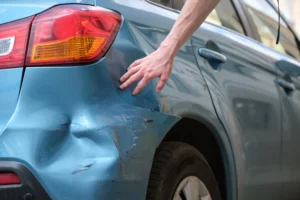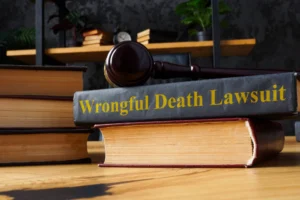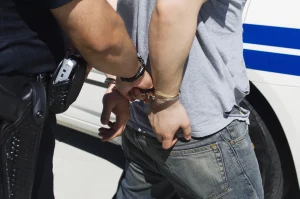What is intoxication manslaughter in Texas? Simply put, it is a serious charge that occurs when an individual causes the death of another person due to intoxication from drugs or alcohol. This felony charge can lead to life-altering consequences including hefty fines, long-term imprisonment, and a permanent criminal record.
If you or a loved one is facing intoxication manslaughter charges, you need to hire the best DWI lawyer Laredo has to offer and fast. Every moment that you don’t have a skilled intoxication manslaughter attorney building your defense is another moment that the prosecution prepares to put you away. Defend your freedom and contact Guzman Law Firm today for a consultation with Rising Star Super Lawyer Javier Guzman, who can guide you through your case and fight for your rights.
What does intoxication manslaughter mean?
Under Texas Penal Code § 49.08, intoxication manslaughter occurs when a person unintentionally causes the death of someone else while operating a vehicle or heavy machinery under the influence of alcohol or drugs. While it’s typically classified as a second-degree felony, aggravating factors, such as killing a first responder or law enforcement officer, can elevate the charge and increase penalties.
So, what are the elements of intoxication manslaughter in Texas? To establish intoxication manslaughter, the prosecution must prove the following elements:
- Intoxication: The accused must have been intoxicated at the time of the incident. Under Texas law, intoxication can occur due to alcohol, controlled substances, or any other substance that impairs normal mental or physical faculties. A person is also legally intoxicated if their blood alcohol concentration (BAC) is 0.08% or higher.
- Operation of a vehicle or equipment: The accused must have been operating a motor vehicle, aircraft, watercraft, or amusement ride, or assembling a mobile amusement ride in public at the time of the incident.
- Causation: The intoxicated individual must have caused the death of another person. The state must show that intoxication was the key factor contributing to the fatality.
- Death of another: The offense must have directly resulted in another person’s death. This includes not just passengers, but also other drivers, pedestrians, cyclists, or anyone else affected by the accident.
If you are arrested for driving under the influence with a CDL, call Guzman Law Firm at (956) 516-7198 today.
How long do you go to jail for intoxication manslaughter in Texas?
Because intoxication manslaughter is a second-degree felony in Texas, the penalties are severe. If convicted, the sentencing guidelines include:
| Imprisonment | Fines | Community service |
| Between 2 and 20 years | Up to $10,000 | Up to 800 hours |
Additionally, those convicted of intoxication manslaughter may face other penalties, such as:
- Driver’s license suspension: This can last for up to two years, significantly disrupting the individual’s ability to work or manage daily life (Learn more about how to reinstate a suspended license in Texas).
- Permanent criminal record: A conviction stays on your criminal record for life, making it harder to find employment, housing, or obtain certain professional licenses.
- Probation: In some cases, a court may grant probation, but this usually comes with strict conditions such as mandatory alcohol or drug treatment programs, regular reporting to a probation officer, and adherence to a curfew.
If the intoxication manslaughter charge is elevated due to the involvement of a law enforcement officer or other aggravating circumstances, the penalties may include life imprisonment or more severe fines.
You should also keep in mind that with felony convictions, the time spent in prison, steep fines, and other secondary punishments often fail to encapsulate the true extent of the fallout. Felony convictions ruin careers, fracture families, and irrevocably alter the trajectory of lives. This is why it is so essential that you hire a lawyer who knows how to defend you against intoxication manslaughter charges, and protect your rights in a court of law.
Continue reading: Can you get a CDL with a criminal record?
Types of intoxication manslaughter defense
While intoxication manslaughter is a grave charge, several legal defenses can be employed to fight the allegations. Understanding the available defenses is critical to building a strong case and potentially avoiding long-term consequences.
Here are some of the key defenses to intoxication manslaughter charges:
1. Lack of intoxication
One of the most common defenses is to dispute the accusation of intoxication itself. This can be done by challenging the methods used to determine intoxication, such as the reliability of field sobriety tests or breathalyzer tests. Blood alcohol concentration (BAC) levels might have been improperly measured, or the machinery used may have been improperly calibrated.
- Breathalyzer and blood test errors: Breathalyzer machines must be maintained and calibrated regularly. Errors in the calibration, improper administration of the test, or contamination of blood samples can all lead to inaccurate results.
- Medical conditions: Certain medical conditions, such as diabetes or acid reflux, can produce symptoms that mimic intoxication or can even affect breathalyzer readings.
2. Causation disputes
Even if the accused was intoxicated, it is not always a given that their intoxication caused the fatal accident. Other factors, such as weather conditions, mechanical failures, or the actions of another driver, may have been the primary cause of the crash.
In these cases, the defense would argue that while the defendant may have been intoxicated, their actions were not the direct cause of the fatality. Disputing causation can reduce or eliminate the charges if the prosecution fails to prove this element.
3. Involuntary intoxication
Another potential defense is involuntary intoxication, where the accused became intoxicated without their knowledge or consent. This could occur if someone unknowingly consumed alcohol or drugs that impaired their ability to drive.
While this defense is challenging to prove, it may be applicable in cases where substances were unknowingly consumed, leading to intoxication and subsequently, the fatal accident.
4. Self-defense or defense of others
In some situations, the accident may have been caused by the intoxicated driver’s actions while trying to defend themselves or others from harm. While rare, under Texas self-defense laws, this type of defense could potentially apply if the circumstances surrounding the accident involve a life-threatening situation where immediate action was required.
This type of defense will boil down to causation in the end, too. Say a large semi swerved into your lane and you had to swerve to avoid being struck, your errant driving would then be the result of trying to protect yourself and others, and you would likely not be liable for the ensuing crash.
Is intoxication a defense for manslaughter?
No, intoxication itself is not a defense to manslaughter charges. In fact, intoxication is the central element that turns a vehicular manslaughter charge into a charge for intoxication manslaughter.
Under Texas law, voluntary intoxication does not excuse or justify reckless or negligent behavior that leads to another person’s death. This means that claiming intoxication as a defense will not absolve an individual from liability, but other defenses, such as those mentioned above, can be used to challenge the prosecution’s case.
Need an intoxication manslaughter attorney? Call Guzman Law Firm.
Facing intoxication manslaughter charges can be an overwhelming and frightening experience. What is intoxication manslaughter, if not a crime with severe penalties — and the long-term consequences can impact every aspect of your life? If you or a loved one has been charged with intoxication manslaughter in Texas, seeking the right legal representation is crucial.
At Guzman Law Firm, we have the knowledge and experience to handle complex intoxication manslaughter cases. We will work diligently to build a strong defense, challenge the evidence against you, and fight for the best possible outcome in your case. Whether you’re seeking to reduce charges, explore alternative sentencing, or prepare for trial, Guzman Law Firm stands ready to fight.
Don’t leave your future to chance. Call Guzman Law Firm at (956) 516-7198 today or contact us online for a consultation, and let our experienced attorneys guide you through the legal process and protect your rights.
More Helpful Articles by Guzman Law Firm:
- What Are the Penalties for Theft of a Firearm in Texas?
- What Felonies Disqualify You from Getting a CDL?
- What Is Illegal Search and Seizure in a Vehicle?
- What Are Some Human Smuggling Examples?
- Do CDL Drivers Get Drug Tested?





